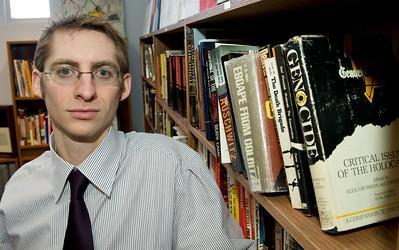
Kiel Majewski, a graduate of the ISU history department, was recently awarded a national fellowship that will enable him to work to end genocide by raising public awareness and affecting political will.

Kiel Majewski, a graduate of the ISU history department, was recently awarded a national fellowship that will enable him to work to end genocide by raising public awareness and affecting political will.
There is a simple phrase mounted on the wall near the entrance to Terre Haute's CANDLES Holocaust Museum: "The only thing necessary for the triumph of evil is for good people to do nothing."
Kiel Majewski, an alumnus of Indiana State University and museum coordinator, has taken that notion to heart by working to stop the mass killings that have taken millions of innocent lives throughout history.
The Genocide Intervention Network recently named Majewski a Carl Wilkens Fellow. He is one of 20 people around the nation to receive the award. The fellowship recognizes community leaders committed to fighting genocide and who have the potential to make a difference in the lives of people in Darfur, Burma and other areas around the world threatened by mass killings. The fellowship will provide Majewski and other fellows with advocacy training, access to experts and an organizing grant.
"The overarching goal of this fellowship is to develop a network on the ground that can affect political will to end genocide," Majewski said.
A 2006 graduate of the ISU history department, Majewski first came in contact with the CANDLES Holocaust Museum during an internship in 2005 and independent study class in 2006. He worked with other ISU history students to rebuild exhibits at the museum, which was severely damaged by arson in 2003. Majewski used oral histories compiled by other students to create new exhibits.
"You know about the Holocaust, but it never really hits you until you meet someone who was there and you can see in their eyes that they're reliving it," he said. "The Holocaust tends to be put in a little box, but it's really the intersection of millions and millions of lives."
Majewski continues to work closely with museum founder Eva Kor and others at the museum, where he started as a part-time employee and now as full-time museum coordinator.
"The ISU history department was really my foot in the door," he said.
Through his work at the museum, Majewski developed an interest in how decisions made on a local level can have far-reaching effects.
"I'm fascinated by the idea of inter-being," he said. "The idea that what affects you affects me and in turn affects people around the world."
He saw the fellowship as a good opportunity to affect change.
"I'm not a Holocaust scholar; instead, I'm coming at this from an interest in theology, interpersonal communications and other areas that tie into an understanding of history," Majewski said, adding that understanding past atrocities is key to helping prevent them in the future. "The Carl Wilkens Fellowship is a great way to bridge the gap and really take my knowledge to the next level by taking action."
Carl Wilkens was the only American to stay in Rwanda through the entirety of the Rwandan genocide. Despite warnings from the American Embassy, Wilkens risked his life to try to help the people he had come to know and love there.
"Change begins with one," Wilkins said. "So few people in America were aware of the Rwanda genocide at the time it was happening and even fewer were equipped to do something to end it. That's why I'm so excited Kiel has been selected to join this year's call of Carl Wilkens Fellows. I know he will be a lifelong leader in the movement to end genocide."
The Hebrew phrase "Tikkun Olam" is used frequently around the museum and translates to "repair the world." Majewski hopes the fellowship will allow him to aid in that repair by helping stop genocide, or what he refers to as "a gross example of brokenness evident when one group of people tries to destroy another group of people."
"You get to a point where you have all the knowledge and you have to decide to share it," he said. "This opportunity is a way to give of my skills and training from the Indiana State University history department to do something permanent."
Through his experiences at Indiana State and now as a professional with the Holocaust Museum, Majewski is eager to take the next step toward leaving his mark on the world. His decision to give of his time and talents to help others comes down to a simple question.
"You play a role whether you want to or not," he said. "The question is, what role will you play'"
---------------------
About the Genocide Intervention Network: The Genocide Intervention Network is working to build the first permanent anti-genocide constituency in the United States, mobilizing the political will to stop genocide when it occurs. Accessible online at www.genocideintervention.net, GI-NET empowers individuals with tools to stop genocide through education, fundraising for civilian protection and advocacy efforts.
About the CANDLES Holocaust Museum: CANDLES is an acronym for "Children of Auschwitz Nazi Deadly Lab Experiments Survivors." The museum was founded in 1995 by Eva Mozes Kor, a twin who survived the genetic experiments of Dr. Josef Mengele in the Auschwitz Concentration Camp. The museum is open Tuesday through Saturday from 1-4 p.m., or by appointment. For group lectures, call 812-234-7881. More information about the museum is available online at www.candlesholocaustmuseum.org
-30-
Writer: Emily Taylor, assistant director of media relations, Office of Communications and Marketing, Indiana State University, 812-237-3790 or etaylor16@indstate.edu
Photo: Kiel Majewski (ISU/Kara Berchem)